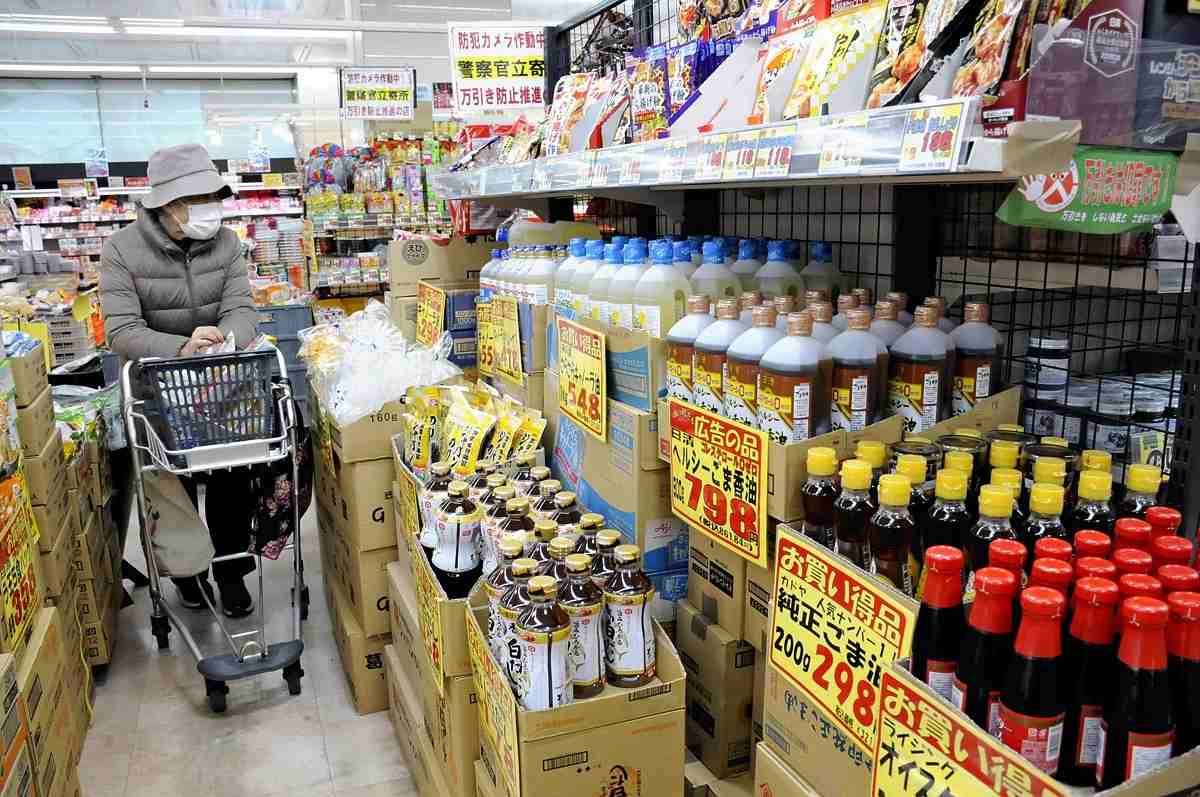
A supermarket in Adachi Ward, Tokyo
21:00 JST, January 19, 2023
With the prices of daily commodities surging in Japan, a growing number of companies are paying inflation allowances to employees to support their daily lives.
Many companies appear to be trying to boost their appeal to attract talent before the shunto wage negotiations begin in spring.
In December, Mitsubishi Motors Corp. paid up to ¥100,000 to its employees as a special assistance allowance.
The company paid out about ¥1.3 billion to about 14,000 workers, including reemployed retirees, contract workers and part-time employees. Management staff did not receive the allowance.
In December, Kobe-based Kenmin Foods Co. gave its staff an allowance, the amount of which was determined by the size of the employee’s household. It also offered the allowance in summer.
“The larger the family, the higher expenses are. We believe that making employees feel secure will help increase their motivation to work,” a company official said.
Research firm Oricon Inc. is giving employees an extra ¥10,000 a month as a special inflation allowance, while electric appliance retailer Nojima Corp. moved forward its pay revisions from April to December and implemented an across-the-board basic pay increase of ¥20,000 per month.
Lump-sum handout
Consumer prices continue to increase. The consumer price index in Tokyo’s 23 wards in December increased 4% year on year, the first time in about 40 years it has reached that level.
Mizuho Research & Technologies Ltd. estimates household spending will increase by ¥96,000 in fiscal 2022 and by ¥40,000 in fiscal 2023.
Many companies think inflation allowances are an effective way to ease the concerns of employees.
In a Teikoku Databank Ltd. survey conducted in November, 26.4% of respondent companies paid or were considering paying such allowances.
“We pay the allowance also as part of efforts to prevent employees from quitting,” a real estate agency said in the survey. Many other respondents cited similar reasons.
A lump-sum allowance was the preferred form of payment for more than 60% of respondents and the average amount was ¥53,700, with more than 15% of respondents setting the amount at ¥100,000 and above.
The provision of the allowances will help expand consumption to a certain extent, according to Yoshiki Shinke, a senior executive economist at the Dai-Ichi Life Research Institute Inc.
However, “It is desirable to implement an across-the-board basic pay increase in order to help employees cope with price increases,” Shinke said. “We need to closely watch the developments of the shunto negotiations to see whether the current trend will continue to spread.”
Top Articles in Business
-

Prudential Life Insurance Plans to Fully Compensate for Damages Caused by Fraudulent Actions Without Waiting for Third-Party Committee Review
-

Narita Airport, Startup in Japan Demonstrate Machine to Compress Clothes for Tourists to Prevent People from Abandoning Suitcases
-

Japan, U.S. Name 3 Inaugural Investment Projects; Reached Agreement After Considerable Difficulty
-

Toyota Motor Group Firm to Sell Clean Energy Greenhouses for Strawberries
-

SoftBank Launches AI Service for Call Centers That Converts Harsh Customer Voices into Softer Voices
JN ACCESS RANKING
-

Japan PM Takaichi’s Cabinet Resigns en Masse
-

Japan Institute to Use Domestic Commercial Optical Lattice Clock to Set Japan Standard Time
-

Israeli Ambassador to Japan Speaks about Japan’s Role in the Reconstruction of Gaza
-

Man Infected with Measles Reportedly Dined at Restaurant in Tokyo Station
-

Videos Plagiarized, Reposted with False Subtitles Claiming ‘Ryukyu Belongs to China’; Anti-China False Information Also Posted in Japan




















